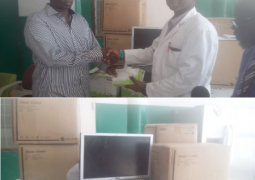Kairasuu Federation, an affiliate of ChildFund, on 8 January 2013 held a daylong open community field health talks in Mamuda village, Kombo South district, West Coast Region.
Adama Sanneh, programme development officer, said the activity was conducted to boost the fight against tuberculosis, malaria and HIV/AIDS. .
The activity, according to Mr Sanneh, was funded by Kairasuu Federation to fight against TB, Malaria and HIV/AIDS in partnership with the Ministry of Health and Social Welfare.
The activity was geared towards reducing the morbidity and mortality caused by TB, malaria and HIV/AIDS in The Gambia through community sensitization campaigns and outreach activities in the targeted areas of operation.
“This programme is conducted every three months as part of the programmes implementation plan of Kairasuu,” Mr Sanneh added.
The prizes given to winners included plastic buckets, plastic plates, plastic pans, market baskets, kettles and a lot of other items worth thousands of dalasis.
One of the lead resource persons, Wurry Jallow, a Community Health nurse postes at Tujereng, described malaria as a life-threatening disease caused by the plasmodium parasite spread by the female anopheles mosquito in humans.
According to Mrs Jallow, statistics have shown that malaria kills one million people each year of which 90% are from Africa, and those at high risk are children under-five and pregnant women.
She noted that malaria signs and symptoms develop between 7 and 21 days after a bite by the female anopheles mosquito, which carries the parasite.
“It is through a blood test that it can be confirmed that this particular patient is suffering from malaria, and the treatment prescribed by the health personnel must be followed correctly,” she said.
While commenting on the protection and prevention from contracting HIV and the VTC in all the health facilities, Mrs Jallow also advised the community to rush to the nearest hospital whenever they suspect severe coughing, for investigations and prompt treatment of TB.
The sensitization has been very effective as growing number of people are becoming aware of the signs and symptoms of TB, noted the community health nurse.
Mrs Jallow said people should report to the nearest clinic when they suspect themselves of having or seeing these signs and systems, for immediate testing and diagnosis.
Speaking to one of the participants, Malissa Mendy, who won herself a plastic pan and a kettle during the question-and-answer session, urged her colleagues to serve as goodwill ambassadors to disseminate the information and knowledge gained from the campaign to others in the community.
She used the opportunity to commend Kairasuu for what she described as a vital and useful meeting.


